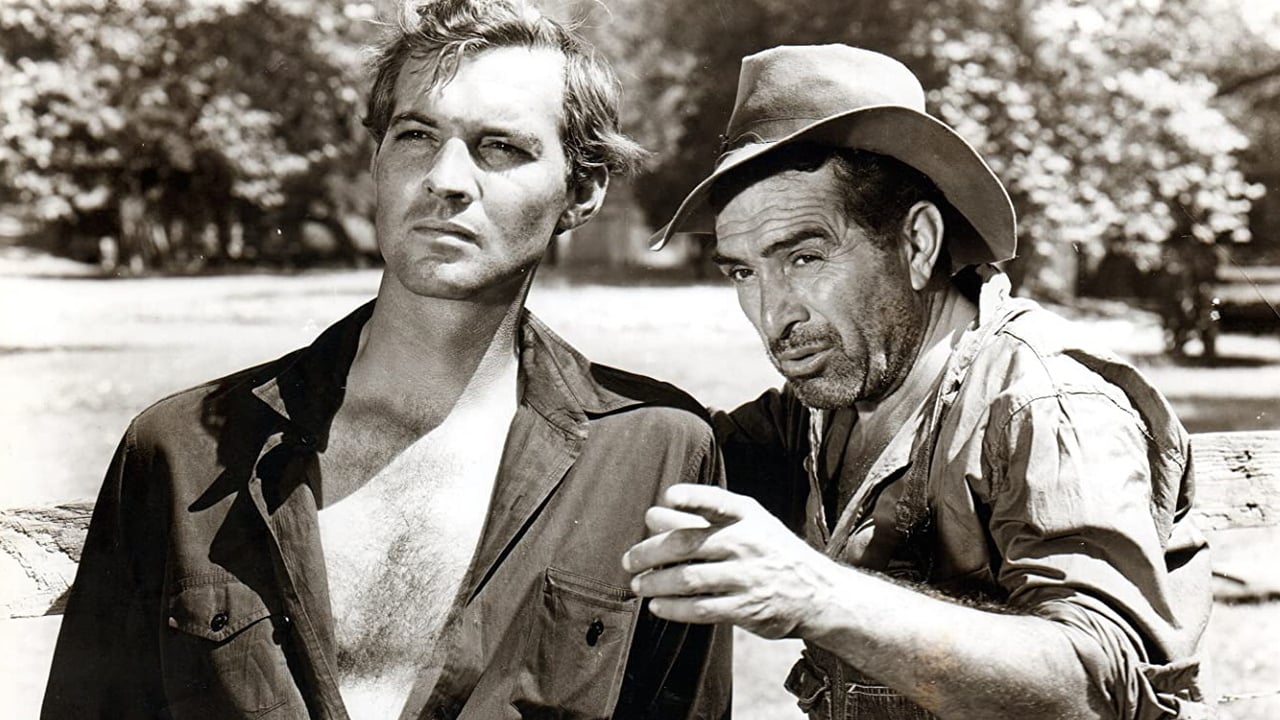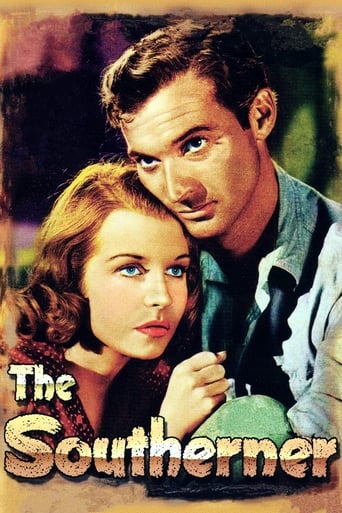

Too much about the plot just didn't add up, the writing was bad, some of the scenes were cringey and awkward,
... View MoreThere are better movies of two hours length. I loved the actress'performance.
... View MoreI wanted to like it more than I actually did... But much of the humor totally escaped me and I walked out only mildly impressed.
... View MoreThe film never slows down or bores, plunging from one harrowing sequence to the next.
... View MoreBased on all the historical evidence, Renoir was granted independence in the making of The Southerner and it shows in his direction and control of stylistics. The pastoral setting is explored with great depth of field, while characters are staged in depth through windows like in many of Renoir's French films (M. Lange, La Chienne). The story is the epitome of apropos - "if you're working for a big outfit, maybe you don't get rich but you still get your pay even if the crops is bad. But the little guy who is growing his own, if his crops is ruined, he's got nothing left". This warning given to Sam Tucker sets up the drama of the story while also commenting on the methods of producing the film itself. The mobile framing and long take pans accompanied by voice-over dialogue would be quite unconventional for a Hollywood audience and are much more in tune with the kind of documented eye of social cinema which Vigo promoted. As much as the stylistics are European and Renoirian in origin, the story is a corny slice of Americana - to live on the land you own, catching trophy catfish, grandma watching over things from her rocking chair. It speaks to America... even ironically lies to America. "Land needs rest like a man. That's why the Lord invented Sunday" is of course ridiculous given that Sunday was invented by the citizens of the French Republic. Renoir makes the most of the realism that can be achieved through exterior shooting on location and not on the studio sets. The house that is used literally sits on a crooked foundation creating impact on the viewer where skewed perspectives juxtapose with prospects of hopes and dreams. There is no class conflict in this film... the conflict plays out within the working class. Renoir falls back on some decoupage classique but frames a great fight sequence through it. The most unRenoir element of the film is the portrayal of the wife who supports 100% her husband and at no point creates even the slightest amount of stress of strife for him... she is in effect a cardboard cutout "woman folk". For all the massacring of Renoir's films in the cutting rooms, The Southerner could do with the removal of anachronistic misogynist traditional values in some of his Hollywood films. Renoir always believed in egalitarianism for women especially, so one can see that as much as The Southerner is considered "independent", Renoir was still bound by the puritanical values of the society to which his film would be distributed.
... View MoreThe story of Zachary Scott and his family -- wife Betty Field, two young kids, and ornery Grandma -- who start with nothing and try to make a living growing cotton on a patch of Texas prairie.One might expect this to be a kind of rerun of 1940's "The Grapes of Wrath" but it isn't. "Grapes" was an object lesson in Marxism's transition from "false consciousness" to "class consciousness," except for Ma's sell-out speech about "the people that live" at the end. I'm not objecting to the Marxism, just pointing it out."The Southerner" doesn't pit the poor and exploited against the rich. Scott's family is really dirt poor, and their neighbors are a nasty family, but the antagonist here is not Management but force majeur. Scott has a corny speech in the midst of his struggling cotton patch in which he talks to the Man Upstairs and asks what's up. It's a reasonable question in context.Happily, Scott's family is not straight out of Walt Disneyland. Grandma is a whining, selfish pain in the neck who imparts dumb hick medical advice. Betty Field is more in the mold of the supportive wife, while the two kids are there mainly to provide a focus for worry.This poverty looks real. The people that work in the fields really look dirty. Everybody looks dirty. One kid get pellagra, the result of a lack of niacine from vegetables and fruits. The reason he gets it is that, during their first winter, the family simply has nothing to eat but flour, dried corn, and whatever "varmits" Scott and his dog can manage to bring home. It's horrifying to see how happy they are when Scott brings home a possum. You have to be pretty badly off to eat a marsupial.The plot follows a familiar trajectory, hope followed by disappointment, impending triumph blighted by disaster. But the acting is pretty good. None of the leads had a distinguished career but they're convincing enough here. The script gives us some neat character studies too, including J. Carrol Naish as the embittered and jealous neighbor with the nasty son and the generous daughter. The last scene involves the rescue of the family cow (they finally got one) from a flooded river and is well executed. And the director, Jean Renoir, stages one fist fight and two comic episodes of violence in unexpected ways. Not brutal, just unexpected.The ending, as you might expect, has everyone bravely putting their shoulders back against the wheel, their faces bright with hope -- even Grandma's.
... View MoreThe famed French director, Jean Renoir, spent a few years in Hollywood during WWII making films before ultimately returning home to continue his career following the defeat of the Nazis. "The Southerner" is one of these Hollywood-produced films made by Renoir.The film begins on a cotton field and one of the pickers has a heart attack. As he lies there dying, he urges his nephew (Zachary Scott) to get his own land and give up the hard life of a picker. So in the next scene, Scott gets his boss to agree to let him farm some old land that's been sitting vacant for many years. The idea sounds good, but when Scott sees the land he wonders if he has a prayer of making it work, as the farmhouse is almost completely in ruins and the place looks like a disaster area. Naturally, times are very, very difficult for the family and it's an interesting portrayal of a tough bygone way of life that few today in the USA can remember. Overall, it's unrelentingly depressing—and the family's life is made more so by an evil neighbor (J. Carroll Naish) who seems to delight in making them more miserable! But how can they possibly make it with so many things stacked against them? Tune in and see for yourself.While the film is not always pleasant, it does make for compelling viewing—you just can't stop watching the family fighting to eke out a meager existence. In this sense, it's very reminiscent of the film "The Good Earth"—but set in rural Southern America. And, historically speaking, it's an important film—mostly because aside from this, Hollywood tended to ignore this lifestyle. I was thinking about giving the film an 8 (it's very, very good), but I deducted a point for Beulah Bondi's over the top performance.By the way, despite Beulah Bondi looking and sounding like a more ancient, more annoying and insane version of Granny from "The Beverly Hillbillies" in this film, she isn't actually that old when she made the film (she was in her 50s). It seems Bondi played so many old women parts people just assumed she was an old woman—even when making films in her 30s and 40s.
... View MoreThe movies (the old movies, that is) are a wondrous thing. You can be convinced of a fixed opinion about a film and then, poof! just like that, your mind is suddenly changed. This happened to me the other night when re-visiting Jean Renoir's 1945 THE SOUTHERNER on Turner Classics Movies. Truthfully, I never liked this highly acclaimed picture and have always held that Renoir's enforced exile to Hollywood after his greatest work, LA REGLE DU JEU, flopped in France in 1939, was, on balance, a disaster; now after seeing THE SOUTHERNER again I think I might have been over these many years a tad too harsh.At the very least, THE SOUTHERNER need be commended for what it is not. It is not THE GRAPES OF WRATH. Beulah Bondi, God preserve us, is not Jane Darwell (As a matter of fact, her cussedly grandmother is a glorious antidote to Darwell's revered stereotype.) Zachary Scott is, surprisingly, more credibly human than and (predictably) less saintly than Hank Fonda. Renoir's mise-en-scene looks like John Ford's in its simplicity but is without Pappy's characteristically annoying cliché visual embellishments. An added plus is Betty Field's beauty as Scott's resilient wife.THE SOUTHERNER is a significant film even if it isn't a great or important one for it might be with this independently produced picture by one of the notorious Hakim brothers that Renoir's interests shifted almost entirely away from character and psychology and toward a more exclusive focus on the effects of environment on human perspective and on the way time shapes the soul through the change of seasons. This philosophical take was expanded to include the acceptance of death when he went to India six years later to film Rumer Godden's autobiographical novel, THE RIVER. Thus, the shift to something religious and quasi- Eastern in outlook probably first took effect for keeps in Renoir's work with THE SOUTHERNER.I'll always prefer the more dramatically eventful, cosmopolitan Renoir of France and the thirties over the more innocent, meditative vagabond that came afterward but I am now willing to admit that the great challenge of his work as a whole is that he is never more sophisticated than when he is being most simple and never more simple than when he is at his most sophisticated.Was this review helpful to you?
... View More